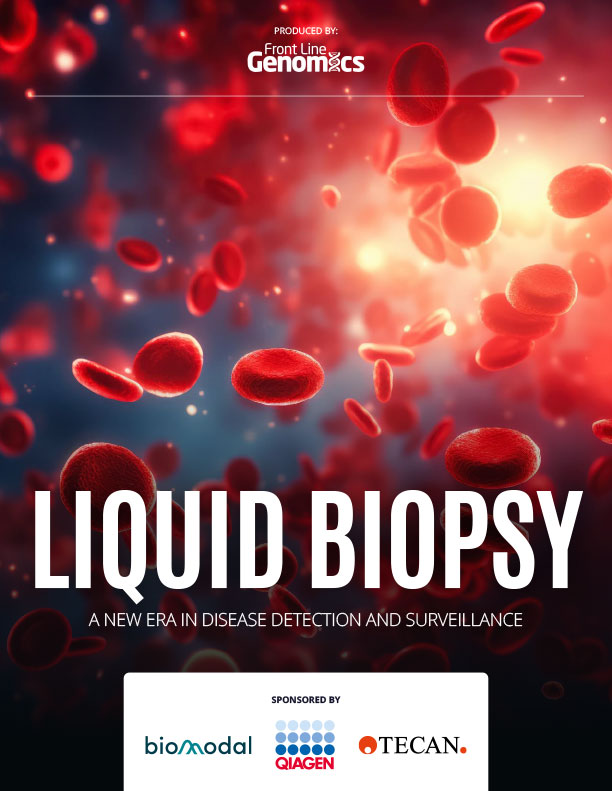
LIQUID BIOPSY
A NEW ERA IN DISEASE DETECTION AND SURVEILLANCE
Liquid biopsy is poised to redefine the way we approach diagnostics and personalized medicine in the treatment of complex diseases. In the last year, we have seen some incredible developments within the field, further illustrating the clinical utility of this transformative technique. However, the field is rapidly progressing, making it difficult to keep track of the latest assays, research and trial results.
To address this issue, we are launching this year’s Liquid Biopsy Intelligence Report, a free-to-download resource bringing you the advancements, insights and research from leading experts in the liquid biopsy field.
This report covers the most impactful developments in liquid biopsy from the last year. Containing 7 in-depth chapters exploring areas covering major liquid biopsy clinical trials, developments in multi-cancer detection tests, biomarker discovery and the role of liquid biopsy in neurological disorders, this report features the latest and most exciting findings this year had to offer.
What’s included in the report?
- A helpful guide to liquid biopsy biomarker analysis, including the latest products, equipment and commercially available assays.
- Exclusive interviews and insights from 17 expert contributors within the field, including Klaus Pantel, Lauren Leiman and Charles Swanton.
- Exciting updates and results from major clinical trials and programmes, including the eagerly awaited NHS-Galleri trial.
- A comprehensive overview of the applications of liquid biopsy, including early cancer detection, MRD analysis and the diagnosis of neurological disorders.
- Insights into how liquid biopsy is currently changing oncological care within the NHS and beyond, and a glimpse into the future of this transformative technique.
Report chapters include:
Chapter 1: Back to Basics – An Introduction to Liquid Biopsy
This chapter contains an overview of liquid biopsy, including brief explanations of key concepts, major developments in the field and what the future may hold for liquid biopsy.
Chapter 2: Tools of the Trade
Given the rapid development of the liquid biopsy field, there are now a growing number of suppliers of liquid biopsy instruments and products. This chapter explores the different liquid biopsy techniques, platforms and advancements, helping researchers select a method and supplier that suits their needs.
Chapter 3: Liquid Biopsy in Early Cancer Detection and Diagnosis
The development of liquid biopsy techniques has had a major impact on cancer diagnosis, garnering impressive media attention in the last year. This chapter will explore the promising future of liquid biopsy multi-cancer early detection tests and cancer screening programs.
Chapter 4: Liquid Biopsy in Cancer Surveillance and Resistance
The field of personalised cancer therapy may also benefit hugely from liquid biopsy analysis. This chapter covers the major studies that illustrate the potential applications of liquid biopsy in informing treatments, monitoring minimal residual disease, and detecting drug resistance.
Chapter 5: Beyond Oncology – Liquid Biopsy in Neurological Disorders
Early diagnosis and intervention can substantially improve patient outcomes for those affected by neurological disorders. In this chapter, we discuss how liquid biopsy can help diagnose neurological conditions faster and the limitations of the technology for this application.
Chapter 6: Clinical Trials – What is Holding Liquid Biopsy Back?
This chapter explores current landscape of liquid biopsy clinical trials, and the limitations of the technology which need to be addressed before its widespread clinical implementation.
Chapter 7: A Glimpse into the Future
Using expert contributions and insights, the final chapter of the report will cover the future advancements that will drive liquid biopsy forward.
The creation of this report would not have been possible without our expert contributors, whose knowledge and insights have made this report an excellent resource for the liquid biopsy research community. We’d like to sincerely thank our contributors; we hope you find their insights valuable.
- Catherine Alix-Panabières, Director of the Laboratory of Rare Circulating Human Cells, The Liquid Biopsy Laboratory, University Medical Centre, Montpellier, France
- Aadel Chaudhuri, Assistant Professor of Radiation Oncology, Washington University, USA
- Hong Chen, Associate Professor of Biomedical Engineering and Neurosurgery, Washington University, USA
- Dana Connors, Director of Translational Science (Cancer) and Associate Director of the Biomarkers Consortium, Foundation for the National Institutes of Health
- David Crosby, Head of Prevention and Early Detection Research, Cancer Research UK
- Alfredo Hidalgo-Miranda, Cancer Genomics Laboratory Lead, National Institute of Genomic Medicine, Mexico
- Michael Hubank, Director of Clinical Genomics, The Royal Marsden NHS Foundation Trust, Scientific Director, NHS England North Thames Genomic Laboratory Hub, Professor of Translational Genomics, Institute of Cancer Research
- Tim Jenkins, Associate Professor of Cell Biology and Physiology, Brigham Young University, USA
- Lauren Leiman, Executive Director, BLOODPAC
- Holli Loomans-Kropp, Assistant Professor in the Division of Cancer Prevention and Control, The Ohio State University, USA
- Klaus Pantel, Director of the Institute of Tumour Biology, Comprehensive Cancer Centre Hamburg, Germany, Chairman, European Liquid Biopsy Society
- Laurie Sanders, Associate Professor in Neurology and Pathology, Duke University School of Medicine, USA
- Cristina Saura, Head of the Breast Cancer Unit, Vall d’Hebron University Hospital, Spain, Group Leader of the Breast Cancer Research Group, Vall d’Hebron Institute of Oncology (VHIO), Spain
- Richard Simcock, Chief Scientific Officer, Macmillan Cancer Support
- Naureen Starling, Principal Investigator and Consultant (Medical Oncology), The Royal Marsden Hospital, UK
- Charles Swanton, Chief Investigator, NHS-Galleri Trial and UCL Cancer Institute
- Andy Tao, Professor of Chemistry and Biochemistry, Purdue University, USA
Download Report
ABOUT US CONTACT ADVERTISE PRIVACY POLICY
Front Line Genomics Limited is registered in England and Wales. Company Number 10421716, VAT: GB 297 742 548.
Registered Office: Ground Floor, Cromwell House, 15 Andover Road, Winchester, Hampshire, SO23 7BT
